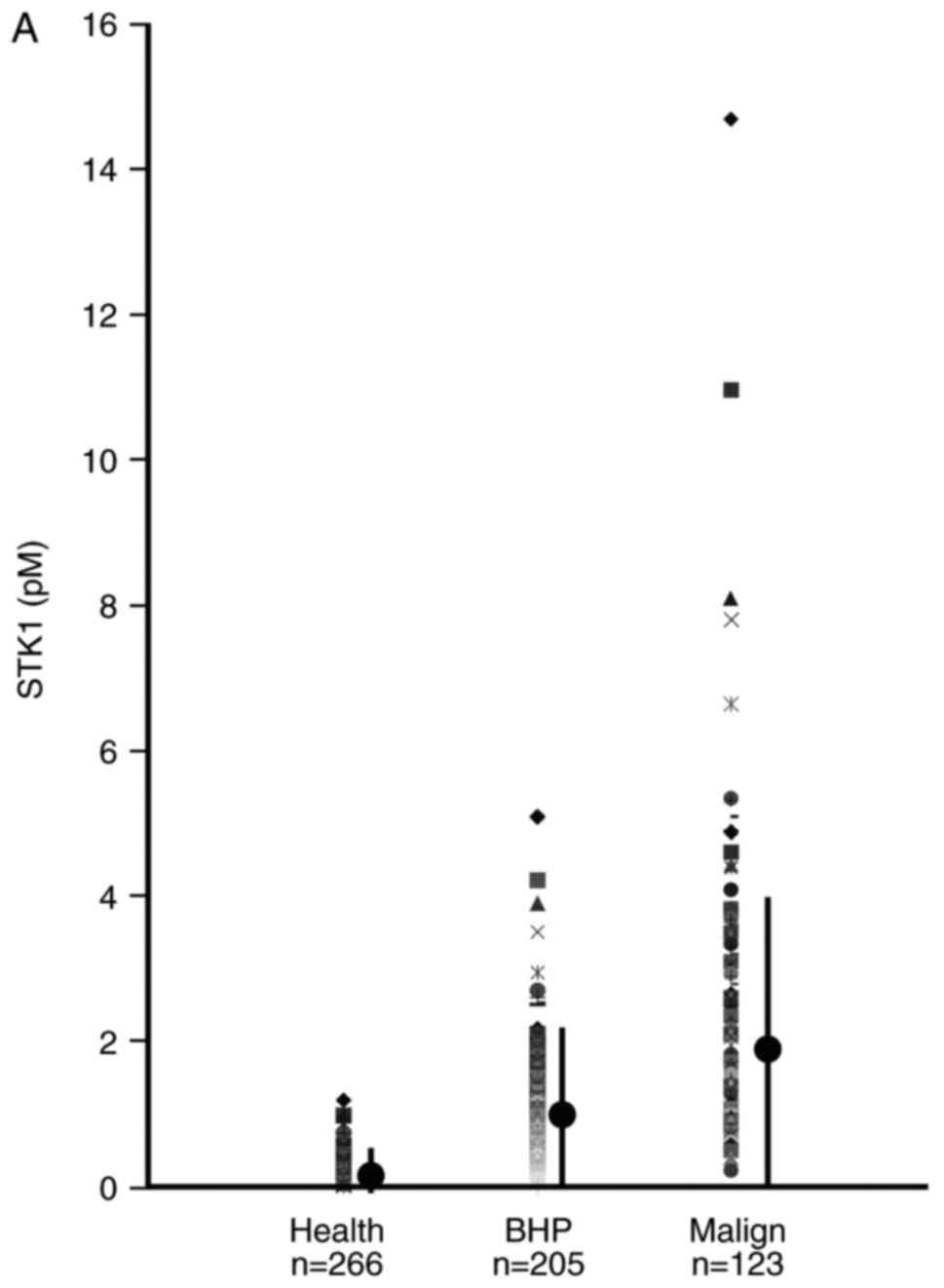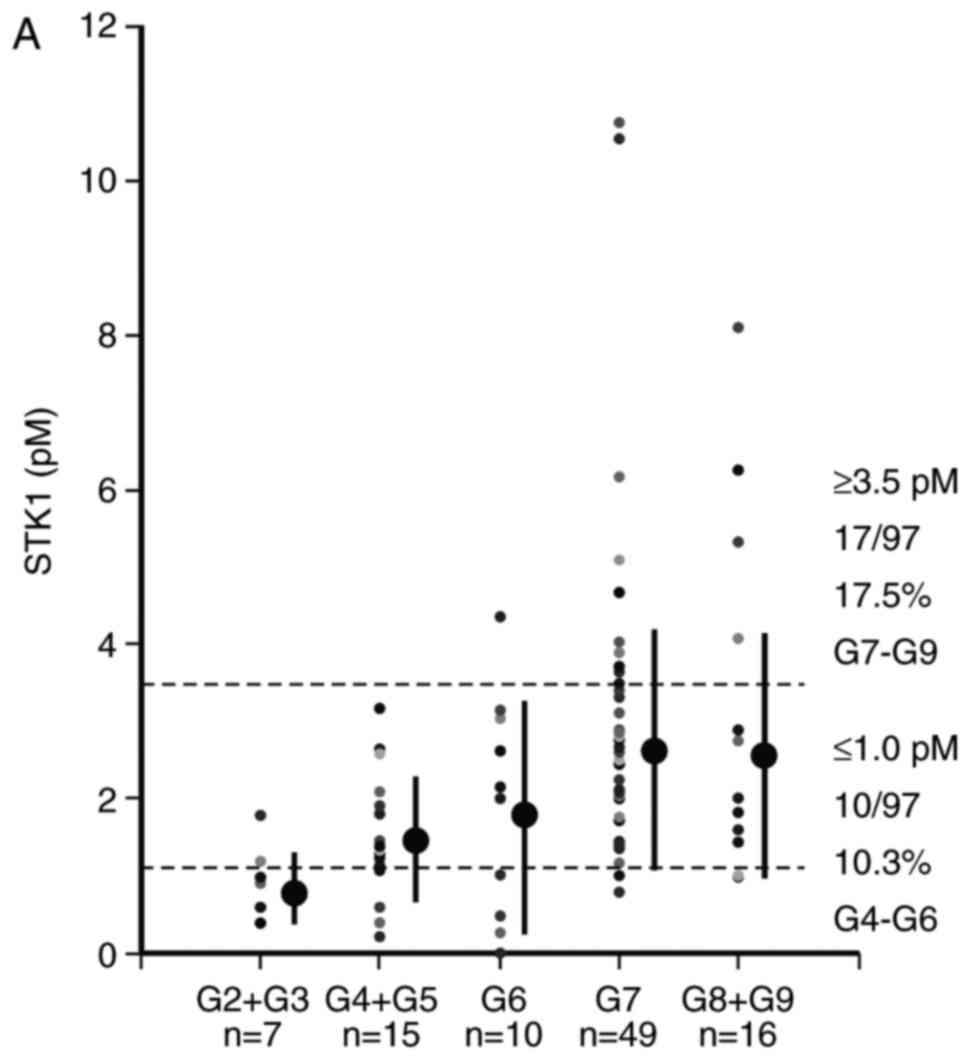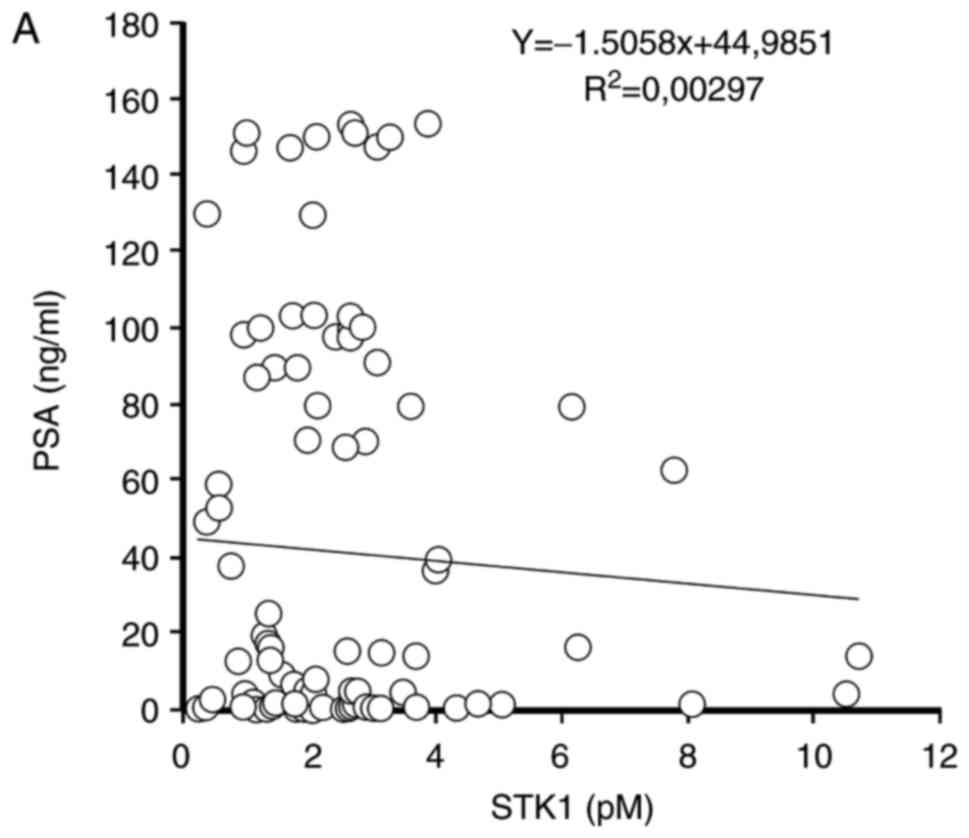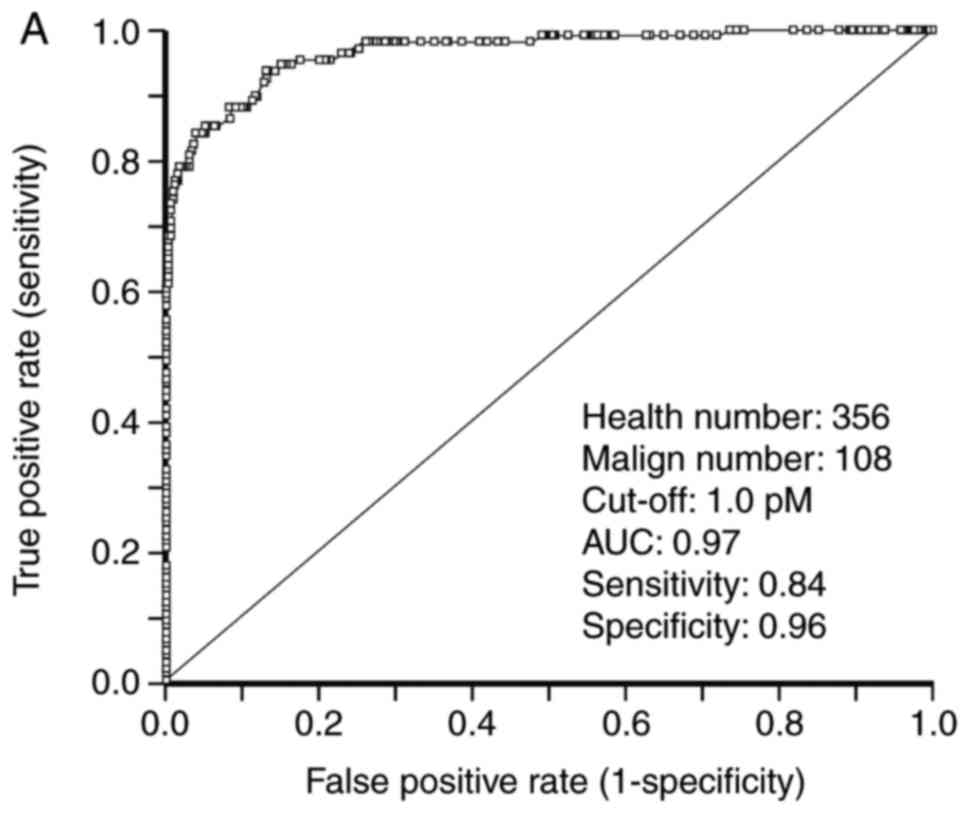|
1
|
Global Burden of Disease Cancer
Collaboration, ; Fitzmaurice C, Dicker D, Pain A, Hamavid H,
Moradi-Lakeh M, MacIntyre MF, Allen C, Hansen G, Woodbrook R, Wolfe
C, et al: The global burden of cancer 2013. JAMA Oncol. 1:505–527.
2015. View Article : Google Scholar : PubMed/NCBI
|
|
2
|
Hoffman RM, Meisner AL, Arap W, Barry M,
Shah SK, Zeliadt SB and Wiggins CL: Trends in United States
prostate cancer incidence rates by age and stage, 1995–2012. Cancer
Epidemiol Biomarkers Prev. 25:259–263. 2016. View Article : Google Scholar : PubMed/NCBI
|
|
3
|
Schröder FH, Hugosson J, Roobol MJ,
Tammela TL, Zappa M, Nelen V, Kwiatkowski M, Lujan M, Määttönen L,
Lilja H, et al: Screening and prostate cancer mortality: Results of
the European randomised study of screening for prostate cancer
(ERSPC) at 13 years of follow-up. Lancet. 384:2027–2035. 2014.
View Article : Google Scholar : PubMed/NCBI
|
|
4
|
Siegel RL, Miller KD and Jemal A: Cancer
statistics, 2017. CA Cancer J Clin. 67:7–30. 2017. View Article : Google Scholar : PubMed/NCBI
|
|
5
|
Siegel R, Naishadham D and Jemal A: Cancer
statistics, 2013. CA Cancer J Clin. 63:11–30. 2013. View Article : Google Scholar : PubMed/NCBI
|
|
6
|
Chen W, Zheng R, Baade PD, Zhang S, Zeng
H, Bray F, Jemal A, Yu XQ and He J: Cancer statistics in China
2015. CA Cancer J Clin. 66:115–132. 2016. View Article : Google Scholar : PubMed/NCBI
|
|
7
|
Gleason DF: Classification of prostatic
carcinomas. Cancer Chemother Rep. 50:125–128. 1966.PubMed/NCBI
|
|
8
|
Amin MB, Schultz DS and Zarbo RJ: Analysis
of cribriform morphology in prostatic neoplasia using antibody to
high-molecular-weight cytokeratins. Arch Pathol Lab Med.
118:260–264. 1994.PubMed/NCBI
|
|
9
|
Epstein JI, Allsbrook WC Jr, Amin MB and
Egevad LL: The 2005 International Society of Urological Pathology
(ISUP) consensus conference on gleason grading of prostatic
carcinoma. Am J Surg Pathol. 29:1228–1242. 2005. View Article : Google Scholar : PubMed/NCBI
|
|
10
|
Eggener SE, Badani K, Barocas DA,
Barrisford GW, Cheng JS, Chin AI, Corcoran A, Epstein JI, George
AK, Gupta GN, et al: Gleason 6 prostate cancer: Translating biology
into population health. J Urol. 194:626–634. 2015. View Article : Google Scholar : PubMed/NCBI
|
|
11
|
Epstein JI, Egevad L, Amin MB, Delahunt B,
Srigley JR and Humphrey PA; Grading Committee, : The 2014
International Society of Urological Pathology (ISUP) consensus
conference on gleason grading of prostatic carcinoma: Definition of
grading patterns and proposal for a new grading system. Am J Surg
Pathol. 40:244–252. 2016.PubMed/NCBI
|
|
12
|
Gordetsky J and Epstein J: Grading of
prostatic adenocarcinoma: Current state and prognostic
implications. Diagn Pathol. 11:252016. View Article : Google Scholar : PubMed/NCBI
|
|
13
|
Suzuki H, Komiya A, Kamiya N, Imamoto T,
Kawamura K, Miura J, Suzuki N, Nakatsu H, Hata A and Ichikawa T:
Development of a nomogram to predict probability of positive
initial prostate biopsy among Japanese patients. Urology.
67:131–136. 2006. View Article : Google Scholar : PubMed/NCBI
|
|
14
|
Shipitsin M, Small C, Choudhury S, Giladi
E, Friedlander S, Nardone J, Hussain S, Hurley AD, Ernst C, Huang
YE, et al: Identification of proteomic biomarkers predicting
prostate cancer aggressiveness and lethality despite
biopsy-sampling error. Br J Cancer. 111:1201–1212. 2014. View Article : Google Scholar : PubMed/NCBI
|
|
15
|
Epstein JI, Feng Z, Trock BJ and
Pierorazio PM: Upgrading and downgrading of prostate cancer from
biopsy to radical prostatectomy: Incidence and predictive factors
using the modified Gleason grading system and factoring in tertiary
grades. Eur Urol. 61:1019–1024. 2012. View Article : Google Scholar : PubMed/NCBI
|
|
16
|
Pezaro CJ, Omlin A, Lorente D, Nava RD,
Ferraldeschi R, Bianchini D, Mukherji D, Riisnaes R, Altavilla A,
Crespo M, et al: Visceral disease in castration-resistant prostate
cancer. Eur Urol. 65:270–273. 2014. View Article : Google Scholar : PubMed/NCBI
|
|
17
|
Ramakrishnan VM, Bossert K, Singer G,
Lehmann K and Hefermehl LJ: The impact of the 2005 International
Society of Urological Pathology Gleason grading consensus on active
surveillance for prostate cancer. Cent European J Urol. 70:344–348.
2017.PubMed/NCBI
|
|
18
|
Lima NG, Soares Dde F and Rhoden EL:
Importance of prostate-specific antigen (PSA) as a predictive
factor for concordance between the Gleason scores of prostate
biopsies and RADICAL prostatectomy specimens. Clinics (Sao Paulo).
68:820–824. 2013. View Article : Google Scholar : PubMed/NCBI
|
|
19
|
Liu X, Chen X, Rycaj K, Chao HP, Deng Q,
Jeter C, Liu C, Honorio S, Li H, Davis T, et al: Systematic
dissection of phenotypic, functional, and tumorigenic heterogeneity
of human prostate cancer cells. Oncotarget. 6:23959–23986.
2015.PubMed/NCBI
|
|
20
|
Sfanos KS and De Marzo AM: Prostate cancer
and inflammation: The evidence. Histopathology. 60:199–215. 2012.
View Article : Google Scholar : PubMed/NCBI
|
|
21
|
Grimm P, Billiet I, Bostwick D, Dicker AP,
Frank S, Immerzeel J, Keyes M, Kupelian P, Lee WR, Machtens S, et
al: Comparative analysis of prostatespecific antigen free survival
outcomes for patients with low, intermediate and high risk prostate
cancer treatment by radical therapy. Results from the Prostate
Cancer Results Study Group. BJU Int. 109 Suppl 1:S22–S29. 2012.
View Article : Google Scholar
|
|
22
|
Thompson I, Thrasher JB, Aus G, Burnett
AL, Canby-Hagino ED, Cookson MS, D'Amico AV, Dmochowski RR, Eton
DT, Forman JD, et al: Guideline for the management of clinically
localized prostate cancer: 2007 update. J Urol. 177:2106–2131.
2007. View Article : Google Scholar : PubMed/NCBI
|
|
23
|
Wilt TJ, MacDonald R, Rutks I, Shamliyan
TA, Taylor BC and Kane RL: Systematic review: Comparative
effectiveness and harms of treatments for clinically localized
prostate cancer. Ann Int Med. 148:435–448. 2008. View Article : Google Scholar : PubMed/NCBI
|
|
24
|
Mitchell JM: Urologists' use of
intensity-modulated radiation therapy for prostate cancer. N Engl J
Med. 369:1629–1637. 2013. View Article : Google Scholar : PubMed/NCBI
|
|
25
|
Ilic D, Neuberger MM, Djulbegovic M and
Dahm P: Screening for prostate cancer. Cochrane Database Syst Rev.
31:CD0047202013.
|
|
26
|
Herschman JD, Smith DS and Catalona WJ:
Effect of ejaculation on serum total and free prostate-specific
antigen concentrations. Urology. 50:239–243. 1997. View Article : Google Scholar : PubMed/NCBI
|
|
27
|
Pron G: Prostate-specific antigen
(PSA)-based population screening for prostate cancer: An
evidence-based analysis. Ont Health Technol Assess Ser. 15:1–64.
2015.
|
|
28
|
Skog S, He E and Haghdoost S: Prevention
and early detection of human tumor. LAP Lambert Academic
Publishing; pp. 742017
|
|
29
|
Wu JT: Circulating tumor markers of the
new millennium. AACC Press; New York, NY: pp. 115–117. 2002
|
|
30
|
Bouchardy C, Fioretta G, Rapiti E,
Verkooijen HM, Rapin CH, Schmidlin F, Miralbell R and Zanetti R:
Recent trends in prostate cancer mortality show a continuous
decrease in several countries. Int J Cancer. 123:421–429. 2008.
View Article : Google Scholar : PubMed/NCBI
|
|
31
|
Zhou J, He E and Skog S: The proliferation
marker thymidine kinase 1 in clinical use (Review). Mol Clin Oncol.
1:18–28. 2013. View Article : Google Scholar : PubMed/NCBI
|
|
32
|
Letocha H, Eklöv S, Gronowitz S, Norlen BJ
and Nilsson S: Deoxythymidine in staging of prostatic carcinoma.
Prostate. 29:15–19. 1996. View Article : Google Scholar : PubMed/NCBI
|
|
33
|
Li SJ, Wu G, Ye J, Zhang X, Cheng F, Zhang
KQ and Yan-Feng J: The purpose of blood serum thymidine kinase
level in early screening of prostatic carcinoma. Immun J.
27:459–461. 2011.
|
|
34
|
Jagarlamudi KK, Hansson LO and Eriksson S:
Breast and prostate cancer patients differ significantly in their
serum thymidine kinase 1 (TK1) specific activities compared with
those hematological malignancies and blood donors: Implications of
using serum TK1 as a biomarker. BMC Cancer. 15:662015. View Article : Google Scholar : PubMed/NCBI
|
|
35
|
Aufderklamm S, Hennenlotter J, Todenhoefer
T, Gakis G, Schilling D, Vogel U, Kuehs U, Dlugosch J, Knapp J,
Merseburger A, et al: XPA-210: A new proliferation marker
determines locally advanced prostate cancer and is a predictor of
biochemical recurrence. World J Urol. 30:547–552. 2012. View Article : Google Scholar : PubMed/NCBI
|
|
36
|
Na Y, Sun Z, Ye Z and Sun Y: Guidelines
for the diagnosis and treatment of Urology Surgery in ChinaIII
Guidelines for the diagnosis and treatment of prostate cancer. Ming
L, Su G and He D: People's Health Press; Beijing: pp. 32–84.
2007
|
|
37
|
Grönberg H, Adolfsson J, Aly M, Nordström
T, Wiklund P, Brandberg Y, Thompson J, Wiklund F, Lindberg J,
Clements M, et al: Prostate cancer screening in men aged 50–69
years (STHLM3): A prospective population-based diagnostic study.
Lancet Oncol. 16:1667–1676. 2015. View Article : Google Scholar : PubMed/NCBI
|
|
38
|
Chen ZH, Huang SQ, Wang Y, Yang AZ, Wen J,
Xu XH, Chen Y, Chen QB, Wang YH, He E, et al: Serological thymidine
kinase 1 is a biomarker for early detection of tumours-a health
screening study on 35,365 people using a sensitive chemiluminescent
dot blot assay. Sensor (Basel). 11:11064–11080. 2011. View Article : Google Scholar
|


















